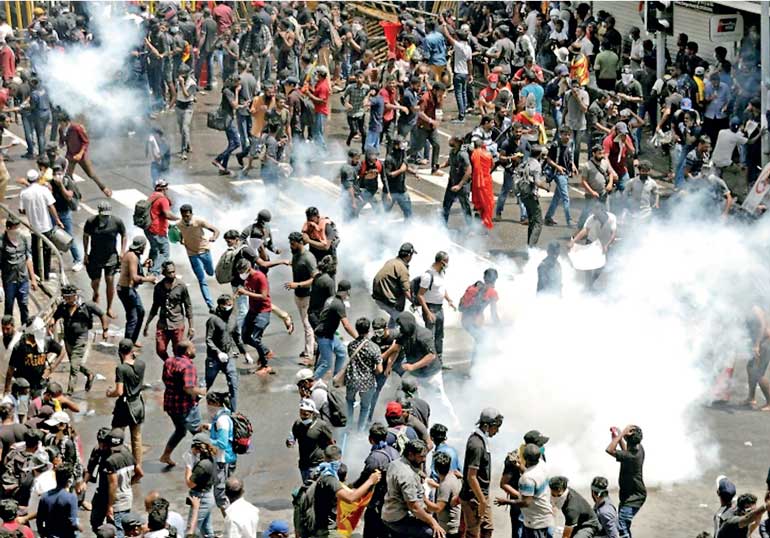Saturday Feb 14, 2026
Saturday Feb 14, 2026
Friday, 23 December 2022 00:00 - - {{hitsCtrl.values.hits}}

Could the country survive without solving this crisis until the next government comes to power?

Since the ending of the internal civil war, I have been vehemently vocal on the need for directing Sri Lanka towards a profound reform program. Following the Black July of 1983, Sri Lanka remained in a bizarre state of persistent bloodshed for a long time, until the end of the internal civil war in 2009. The people of the country were compelled to live in an atmosphere overwhelmed by the fear of death during this long period.
The insurrections launched by the Sinhala and Tamil youth had resulted in the death of a large number of young people. The entire society was rendered more or less dead spiritually, by the brutality unleashed on the society by the Sinhala and Tamil rebels as well as the security forces that suppressed the riots. Though the security forces had succeeded in defeating the Sinhala-Tamil insurrections, both the victorious security forces and the State suffered serious damage from those insurrections.
Many things were destroyed in this ugly socio-political environment, and the things that escaped from being destroyed completely had become distorted and corrupt. This particular socio-political environment had caused to corrupt and distort the politicians of the country and the state including the government officials and the entire institutional system of the state. This situation had plunged the entire state into a dilapidated level.
My role
Introducing necessary reforms without delay, for rectification of the decline and the distortion occurred in the socio-political system and the state had become an essential condition for the very survival of the state and the social system. I used the 25th and 30th anniversary of the Ravaya held in 2012 and 2016 respectively, which were participated by the leaders of major political parties of the country, to point out to them the urgent need for having reforms introduced to overcome this situation.
But when it appeared that the political leaders of the country do not have a genuine interest or commitment in making necessary reforms, I reached the conclusion that, in the absence of essential reforms, the country will inevitably plunge into a great destruction, and consequently there will be a great collapse in the state and the social system, and eventually the country will be pushed into a state of economic bankruptcy and political anarchy.
In order to explain the situation, I wrote and published two books in Sinhala titled “Lankawa Galawaganima” (Rescuing Sri Lanka) and “Jathiye Kedavachakaya” (The Tragedy of the Nation). The number of scholarly articles authored and published by me in this respect could be hundreds. Besides these, I founded an organisation called the “Punaruda Vyaparaya” (Revival Movement) to enlighten the public about the great collapse destined to occur, and nearly 300 public discussions were held raising the public awareness on the impending downfall. I wish to assert that I have always appeared in favour of a profound transformational reform program implemented within a comprehensive framework centred on wide public participation.
I can be considered as one who was able to foresee and predict in advance with a considerable degree of certainty that Sri Lanka will soon fall into this abyss unless appropriate remedial measures were taken to arrest the trend. I was able to make such a prediction because I had focused my keen attention on this question long before it was going to happen. In fact, I had a deep intellectual involvement and emotional relationship with the crisis in Sri Lanka. It was due to the knowledge and discipline I had acquired through perceiving and evaluating the crisis well in advance that I was able to analyse it and make suggestions as to how it should be overcome as soon as Sri Lanka fell into the abyss.
At the time when the country has fallen into a state of bankruptcy and a massive public unrest had emerged in the form of the Aragalaya launched by the youth against president Gotabaya, I appealed to the protesters to take the Aragalaya into a constitutional framework without allowing it to be thrown into an anarchic state; and, at the same time I ventured to meet president Gotabaya and point out to him the importance of directing the country towards adopting a reform program that would make a profound change in the system which is corrupt, and handed over to him a list of reforms required to be introduced together with a methodology that could be adopted in implementing the proposed reforms.
What ought to be done?
I am not a political follower or a protagonist of Gotabaya. During the presidential election, my stance was that Gotabaya was not a suitable person to be appointed the president of the country because he remained indicted with serious allegations. Despite my stance regarding Gotabaya, in the face of the country falling into a state of bankruptcy, I ventured to meet him with my reforms proposals, not with the intention of gaining undue advantage, but with the view to persuading him to direct the country to a reform program without delay, and thereby reduce the possible destruction to the country. Not only did he express his agreement with my proposal, but also he had enlightened Ranil Wickremesinghe about it when the latter was appointed the Prime Minister.
The Prime Minister also spoke to me about the proposal. It is interesting to mention that I had held two rounds of talks previously with Ranil Wickremesinghe about a reform program even before the country went bankrupt. Late Mangala Samaraweera also participated in those discussions. Three of us knew that the country was heading towards a big crisis. We had a rough idea about the need for intervention at an appropriate time and about the reforms to be introduced.
When Prime Minister Ranil Wickremesinghe assumed the presidency, I felt that the opportunity had arisen to lead the country to a reform program. For that purpose I decided to extend my voluntary support to President Ranil Wickremesinghe without expecting any payment or personal benefit. After all, it is an essential condition to create a common consensus among the parties representing the legislature for launching a profound program of reforms. To achieve that purpose, we (the People’s Movement for Reforms) met the leaders of major political parties and discussed this issue with them.
The list of political leaders whom we met and discussed is as follows: Sajith Premadasa, the leader of the Samagi Jana Balavegaya (SJB), Maithripala Sirisena, leader of the Sri Lanka Freedom Party (SLFP), Anura Kumara Dissanayake, leader of the Janatha Vimukthi Peramuna (JVP), Rauff Hakeem, the leader of the Sri Lanka Muslim Congress (SLMC), Basil Rajapaksa, National Organiser, Sri Lanka Podujana Peramuna (SLPP), M.A. Sumanthiran, media spokesperson of the Tamil National Alliance (TNA), Mano Ganesan, leader of the Tamil Progressive Alliance (TPA), Douglas Devananda, leader of the Elam People’s Democratic Party (EPDP) and Champika Ranawaka, leader of the 43rd Brigade.
The purpose of discussing with all of them was to explain the need for having a profound reforms program and the importance of creating a common consensus for adopting a framework which is acceptable to all of them, and would not allow anyone to act arbitrarily in implementing the reforms program. The need for having a profound reform program was accepted by all the leaders. It must be said that the time spent by some leaders for these discussions ranged from two to three hours.
It was evident from some of the statements published in social media that the discussion held with Basil Rajapaksa, the National Organiser of the Sri Lanka Podujana Peramuna (SLPP), has caused great anger in some people. It is not difficult to understand that it was a special situation that has been created and maintained purposefully and systematically rather than being a natural or spontaneous reaction. Many of those who have commented had demonstrated amply, the negative characteristics such as poverty of their knowledge, sometimes their stupidity, political bigotry and their lumpen heritage. The failure of a country is not only an indicator of the failure of politicians and officials alone, but it should also be considered as an indicator of the failure of academics and the professionals of the country as well.
The black market economy of the country is larger than the formal economy. The size of the lumpen social group in the country is also unusually large. It can be said that the lumpen-style debase rowdy language has become the accepted linguistic usage of the revolution and the revolutionary academia. Due to political bigotry or bias, some are inclined to think that the crisis in the country is a matter to be solved by a government elected of their choice and not through the reforms implemented by the incumbent government. Also, they seem to think that whatever may be the reforms to be introduced, they should be implemented in the absence of those representing the Pohottuwa party.
Could the country survive without solving this crisis until the next government comes to power? What will happen to the country if no one gets enough power to form a government in the next election? Since the ruling power rests on the Pohottuwa party, a reform program cannot be implemented without the support of that party. If the Pohottuwa should not be involved in the reform program on the basis that it is corrupt and has committed serious mistakes, then, the same accusation can be levelled more or less against every party that has ruled the country and represented the parliament. Sri Lanka has received a golden opportunity for introducing profound reforms. If this opportunity is not utilised properly, there is no doubt that the nation will be compelled to pay a big compensation for missing it.